A History of the Future: Prophets of Progress from H. G. Wells to Isaac Asimov
Autor Peter J. Bowleren Limba Engleză Hardback – noi 2017
| Toate formatele și edițiile | Preț | Express |
|---|---|---|
| Paperback (1) | 164.94 lei 3-5 săpt. | |
| Cambridge University Press – noi 2017 | 164.94 lei 3-5 săpt. | |
| Hardback (1) | 569.38 lei 6-8 săpt. | |
| Cambridge University Press – noi 2017 | 569.38 lei 6-8 săpt. |
Preț: 569.38 lei
Preț vechi: 639.75 lei
-11% Nou
Puncte Express: 854
Preț estimativ în valută:
108.99€ • 118.42$ • 91.61£
108.99€ • 118.42$ • 91.61£
Carte tipărită la comandă
Livrare economică 21 aprilie-05 mai
Preluare comenzi: 021 569.72.76
Specificații
ISBN-13: 9781107148734
ISBN-10: 1107148731
Pagini: 298
Dimensiuni: 156 x 235 x 18 mm
Greutate: 0.62 kg
Editura: Cambridge University Press
Colecția Cambridge University Press
Locul publicării:New York, United States
ISBN-10: 1107148731
Pagini: 298
Dimensiuni: 156 x 235 x 18 mm
Greutate: 0.62 kg
Editura: Cambridge University Press
Colecția Cambridge University Press
Locul publicării:New York, United States
Cuprins
1. Introduction: progress or threat?; 2. The prophets: their backgrounds and ambitions; 3. How we'll live; 4. Where we'll live; 5. Communicating and computing; 6. Getting around; 7. Taking to the air; 8. Journey into space; 9. War; 10. Energy and environment; 11. Human nature; 12. Epilogue: Plus ça change?
Recenzii
'This is fascinating, wide-ranging and important work, an ambitious attempt to do something it's amazing to think nobody has tried before: to map all the varieties of 'the future' that writers and thinkers have extrapolated over the last dozen decades or so. Professor Bowler expertly sets the terms of the discussion about what the future used to be, and what it might be again.' Adam Roberts, Royal Holloway, University of London
'This wide-ranging survey of the ways in which technological and scientific futures were envisaged in the first half of the last century astutely challenges easy stereotypes, whether of a widespread cultural pessimism about the threats of technical change or of simplistic optimism about the limitless capacities of scientists to achieve utopia. The result is a fascinating and often surprising book, drawing on an impressive range of popular and specialist materials, offering a new account of how the future once looked.' Simon Schaffer, University of Cambridge
'This is a wide-ranging book with an engaging combination of fascinating topics. Bowler leads us through twentieth-century literature, science fiction and futurology to discover the imagined futures that never were.' Sean Johnston, University of Glasgow
'Given his interest in the future scientific and political consequences of eugenics, perhaps it is no surprise that Peter Bowler, a noted historian of biology, has now turned his attention to the topic of futurology more generally. … His discussion of imagined futures built on different systems of air transport is particularly compelling. … Bowler's chapter on human and social engineering shines with vivid detail and nuanced argument. … Overall, Bowler engagingly documents the birth of many tropes about future technology.' Wythe Marschall, Physics Today
'… Bowler's work serves as an intriguing starting point for anyone interested in studying predictions for the future made in the first half of the twentieth century. … A History of the Future is clearly an exceedingly well-researched work that would serve as a wonderful index for study …' The British Society for Literature and Science
'… the subject of this book is futurology in all its forms, with brief mentions of literary futures introduced as needed. Even more than literary texts, … Bowler relies on popular science writing, both in books and in magazines.' Patrick A. McCarthy, Science Fiction Studies
'… Bowler's study is an impressively wide-ranging piece of work - with, I should add, many excellent illustrations in black-and-white and colour - which succeeds both as a stimulating overview and as a work of reference.' Michael Sherborne, The Wellsian
'Methodologically careful in its use of varied sources and conflicting interpretations to avoid false generalizations, A History of the Future provides a historically changing image of futurology based on the links between science fiction literature, popular science magazines, pulp novels, movies, architectural projects and world fairs. Both the connoisseur and the reader unfamiliar with science fiction will find themselves busy (re)reading the novels and watching the movies Bowler brings up in the text.' Marcos de Brum Lopes, Society for U.S. Intellectual History (s-usih.org)
'In A History of the Future, Peter Bowler paints a rich and engaging portrait of the interplay between speculative literature and technological innovation in the public sphere and in doing so sheds light on the processes by which innovations were conceived, created and became part of modern life. The result is a mixture of popular and academic intellectual history that makes a number of important contributions to the history of the origins of science fiction, the role of science in public discourse, and the technologies that competed in an open-ended quest for scientific 'progress'.' Liam Stowell, European Review of History: revue européenne d'histoire
'This wide-ranging survey of the ways in which technological and scientific futures were envisaged in the first half of the last century astutely challenges easy stereotypes, whether of a widespread cultural pessimism about the threats of technical change or of simplistic optimism about the limitless capacities of scientists to achieve utopia. The result is a fascinating and often surprising book, drawing on an impressive range of popular and specialist materials, offering a new account of how the future once looked.' Simon Schaffer, University of Cambridge
'This is a wide-ranging book with an engaging combination of fascinating topics. Bowler leads us through twentieth-century literature, science fiction and futurology to discover the imagined futures that never were.' Sean Johnston, University of Glasgow
'Given his interest in the future scientific and political consequences of eugenics, perhaps it is no surprise that Peter Bowler, a noted historian of biology, has now turned his attention to the topic of futurology more generally. … His discussion of imagined futures built on different systems of air transport is particularly compelling. … Bowler's chapter on human and social engineering shines with vivid detail and nuanced argument. … Overall, Bowler engagingly documents the birth of many tropes about future technology.' Wythe Marschall, Physics Today
'… Bowler's work serves as an intriguing starting point for anyone interested in studying predictions for the future made in the first half of the twentieth century. … A History of the Future is clearly an exceedingly well-researched work that would serve as a wonderful index for study …' The British Society for Literature and Science
'… the subject of this book is futurology in all its forms, with brief mentions of literary futures introduced as needed. Even more than literary texts, … Bowler relies on popular science writing, both in books and in magazines.' Patrick A. McCarthy, Science Fiction Studies
'… Bowler's study is an impressively wide-ranging piece of work - with, I should add, many excellent illustrations in black-and-white and colour - which succeeds both as a stimulating overview and as a work of reference.' Michael Sherborne, The Wellsian
'Methodologically careful in its use of varied sources and conflicting interpretations to avoid false generalizations, A History of the Future provides a historically changing image of futurology based on the links between science fiction literature, popular science magazines, pulp novels, movies, architectural projects and world fairs. Both the connoisseur and the reader unfamiliar with science fiction will find themselves busy (re)reading the novels and watching the movies Bowler brings up in the text.' Marcos de Brum Lopes, Society for U.S. Intellectual History (s-usih.org)
'In A History of the Future, Peter Bowler paints a rich and engaging portrait of the interplay between speculative literature and technological innovation in the public sphere and in doing so sheds light on the processes by which innovations were conceived, created and became part of modern life. The result is a mixture of popular and academic intellectual history that makes a number of important contributions to the history of the origins of science fiction, the role of science in public discourse, and the technologies that competed in an open-ended quest for scientific 'progress'.' Liam Stowell, European Review of History: revue européenne d'histoire
Notă biografică
Descriere
A wide-ranging survey of predictions about the future development and impact of science and technology through the twentieth century.
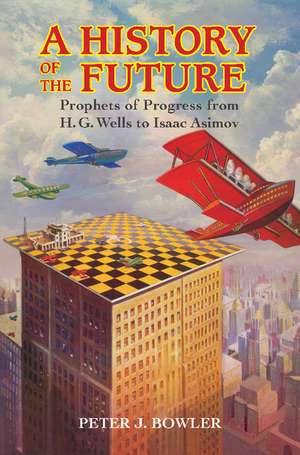
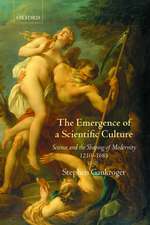






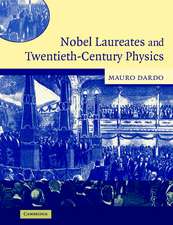


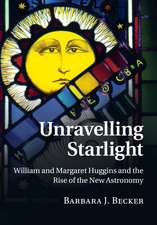



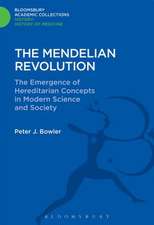
![Contributions of African American Scientists to the Field[s] of Science, Medicine, and Inventions](https://i4.books-express.ro/bt/9781607413196/contributions-of-african-american-scientists-to-the-field-s-of-science-medicine-and-inventions.jpg)

